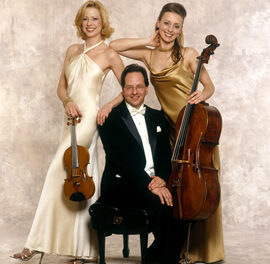The orchestra seating of Dana Auditorium, on the bucolic campus of Guilford College, was well-filled for a special memorial concert that provided heartening testimony of how much Henry Ingram and his wife Lucy have meant to the Triad community. To take advantage of musical possibilities of Christ United Methodist Church, with its glorious Fisk organ, the Ingrams founded Music for a Great Space in 1991. Most of the series’ concerts have taken place there with occasional outings to nearby Temple Emanuel. As co-artistic director, Henry Ingram was tireless in recruiting musicians to come to Greensboro. In addition to numerous organists, ensembles have included the Borromeo String Quartet, the Ciompi Quartet, and Charles Wadsworth and the Spoleto Festival Chamber Musicians on tour. His passing in the fall of 2008 was a major loss.
Soprano Elizabeth Futral, mezzo-soprano Nancy Maultsby, tenor Anthony Dean Griffey, and pianist Warren Jones, artists who had appeared on the series and who were close to Ingram, offered to donate their services for a memorial concert which led to this performance. Unfortunately High Point native and international opera star Griffey was indisposed. Futral, Maultsby, and Jones improvised a choice selection of substitutions, a mix of duets and solo piano pieces that replaced the scheduled program. There was the spirit of a sort of musical “Irish wake” about the hall celebrating life and the joy of music.
The program opened up with vocal fireworks aplenty! Soprano Futral made a grand entrance in character and cut loose with “Quel guardo il cavaliere” (“Glances so soft and bright”) and the aria “So anch’io la virtù magica” (“I know what spells a glance can dart”) from Don Pasquale by Gaetano Donizetti (1797-1848). What wonderful intonation and phrasing and what spectacular coloratura! Jones accompanied her with perfect balance and flair. Next, Maultsby revealed a rich, robust lower mezzo range in “Mon Coeur s’ouvre à ta voix” (“My heart at thy sweet voice”), Dalila’s seductive scene from Act II of Samson and Dalila by Camille Saint-Saëns (1835-1921). She fully conveyed the seductress’ smoldering sensuality.
It was a treat to hear Warren Jones featured in two solo piano selections in each half of the recital. Jones quipped about how vigorous and trim Johannes Brahms (1833-97) had been in his youth. He joked that Brahms’ Rhapsody in G minor, Op. 79, No. 2, was a middle period work with lots of passages with crossed hands, a technique the composer dropped soon after! (Remember the famous woodprint of the composer on his way to his favorite coffee house, the Red Hedgehog?) Jones produced a full, opulent sound and suggested a heroic narrative. After intermission, Franz Liszt (1811-86) the tone painter was on brilliant display in “Sposalizio,” the first piece of Deuxième Année de Pèlerinage: Italie. Jones said Liszt was inspired by Raphael’s painting The Marriage of the Virgin, which features a transparent cathedral. Jones brought a delicate, refined palette of color and dynamics to the quieter passages while producing a soaring forte at the climax.
The opening half of the concert continued with a delightful program change, the gorgeous duet from Act I of Béatrice et Bénédict by Hector Berlioz (1803-69). Futral’s and Maultsby’s voices blended wonderfully as they spun the nocturne-like “Nuit paisible et sereine” (“Serene and peaceful night”). Futral was a melancholy Hero, the younger sister, calmed by the interplay of moonlight and breezes. Maultsby took the role of her older sister Beatrice. Next, Maultsby took a solo turn with a rousing delivery of “You’ll never walk alone,” the well-known show tune from the 1945 Rogers and Hammerstein musical Carousel.
On March 22 Futral will star in the New York premiere of the opera The Grapes of Wrath (2007) by Ricky Ian Gordon (b.1956), a composer much admired by Futral and Jones. Their choice of two of the composer’s songs, “Will there be a morning” and “I went to look for joy,” was a welcome addition to the evening.
After intermission, Jones’ opening Liszt piano selection was followed by Futral’s eloquent and simply phrased “O mio babbino caro” (“Oh my beloved daddy”) from Gianni Schicchi by Giacomo Puccini (1858-1924). Maultsby’s opulent lower range was memorable as she sang the insouciant and seductive “Habañera” from Carmen by Georges Bizet (1838-75).
Another welcome program change came next, the fabulous “Flower Duet,” “Viens, Mallika, les lianes en fleurs,” from Lakmé by Léo Delibes (1836-1891). The voices of Futral and Maultsby blended and interwove magically as the barcarole-like song of Lakmé and her slave Mallika flowed so naturally from them. Futral followed this with an ideally paced performance of “Vilja” from The Merry Widow by Franz Lehár (1870-1948), which she sang in English. For the next selection, Jones really dug into the keys. He created an insistent and throbbing rhythm to support Maultsby’s selection, “El Vito” by the Spanish composer Fernando Obradors (1897-1947). She plumbed her lowest register to produce a guttural, gypsy-like sound.
The Old American Songs (Set I, 1950, & Set II, 1952) of Aaron Copland (1900-90) are very popular. It was very unusual and intriguing to hear Futral and Maultsby do “At the River” (based on an old hymn tune) as a duet. The concert ended magnificently with another program substitution, one of my favorite duets, the magical Barcarole from the Venice Act of Les Contes d’Hoffmann by Jacques Offenbach (1819-80). To have heard Futral and Maultsby sing “Belle nuit, ô nuit d’amor” (“Beautiful night, oh night of love”) was to have been transported by sheer sound to the gently rocking gondola bearing Hoffmann’s friend/Muse Nicklausse and the enticing courtesan Giulietta!












